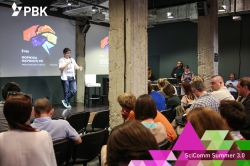The International Science Film Festival “World of Knowledge” was first organized by the studio Lennauchfilm and the National Committee “Russia’s Intellectual Resources” in February of 2006. The festival includes an international competition, a non-competition program and a special program. Even in its first years, the festival had already attracted guests from more than 20 countries.
The 12th International Festival “World of Knowledge” was held in St. Petersburg, sponsored by the Gorky Film Studio. The competition program included films from Russia, France, Germany, Australia, Spain, the UK and others. The festival’s special program was dedicated to the Year of Ecology in Russia. Special screenings were held at the Yeltsin Presidential Library, the Russian Geographical Society headquarters and ITMO University, where director Dmitry Semibratov presented his film “Effect of Rhenium” about an expedition to the site of the discovery of the rare metal rhenium in a volcano on the island of Iturup. As he himself explains, festivals such as this are an opportunity for filmmakers to meet their audience.

“People who come to film festivals aren’t always ready for science films. Today’s audiences are mostly interested in auteur films, art-house, films about social issues, religion, war or period movies. This festival is a good place for people to learn more about the world of science,” – he said.
Yet science films still remain a product for a niche audience. Can such films become truly mainstream? What topics is the audience today interested in? We asked the viewers:
Maxim Gorlach, research associate at ITMO’s Department of Nanophotonics and Metamaterials

I am a researcher and an educator, so I was interested in seeing some modern science films.
I agree that there is a deficit of quality films on popular science, which is why I wanted to learn about the latest developments. I’m a physicist, and, as for my own personal preferences, I’d love to see a scientific documentary that would concern both scientific facts and history. There is a Michael Frayn play called “Copenhagen” that depicts a real-life encounter when Werner Heisenberg, who worked on the Nazi Germany’s nuclear bomb project, came to visit Niels Bohr to recruit him into the project. It’s partially about physics, but it’s also historical. I think that is the kind of complex story that the audiences would find interesting.
In a larger context, I think science films that modern audiences would find interesting should combine an educational aspect – exactly what makes them scientific – with things that are attractive to the regular viewer. There should be a, so to say, “bait”, either in the form of special effects or panoramic shots. A sensible combination of these things should be the right mix to attract a wider audience.
Natalia Savchenko, chemist

I rarely watch science films, so coming to this festival is my way of making up for that. What drew me in is that this is a documentary. I was interested in the subject, too; there are few films like that right now and they’re hard to find.
I think that today’s science films should be, first and foremost, relevant. They shouldn’t be just about some old topic that nobody is interested in anymore or about something only a small group of people cares about. Everything has a target audience. If that audience is young people, then we need to understand what they like and what they care about. And that’s difficult to do in an environment where you can find everything you need in just a click. I also think that maybe if these stories were told by characters from popular culture, a lot more people would see them.
Lidia Lytaeva and Ekaterina Shastina, designers

It’s very exciting to see and learn something new about the lesser-known parts of the world – be it the South Pole, outer space or a faraway spot of Russia. There are so many places on the map we know nothing about: we’d never been there and perhaps we never will.
A science film for a modern audience must respond to a set of clearly defined questions. If we, as an audience, are given answers to these questions, the film will be captivating and have the viewers’ attention. These questions must, of course, be relevant.
Ekaterina Korium, ITMO student, studies nanobiotechnology and bionics

I personally am a fan of documentaries, which is why I came here. I watch a lot of science films and documentaries in general. Anything that deals with the unexplored regions of our country is interesting, too. I would watch everything about the things that haven’t been explored – be it ecology or physics. Can such films appeal to mass audiences? I don’t know. I don’t think this generation is particularly interested in scientific content.
Sergey Sushinskiy, Master’s student, “Science Communication” program.

To make science films more appealing to a wider audience, we need to popularize science, to hold more festivals like this one and establish science communication between them and the various universities all over the country. Besides that, it is important to work with youth science clubs, with the press – both regional and national. If we want people to see these films, we need to make them popular, and I believe this is the responsibility of science communicators.
We have many directors and cameramen and, if this becomes a popular genre, they will take a more active part in the creation of well-made science films. And to make these films interesting to a regular viewer, they need to be made not by the same people who make news reports, but the creative ones, those who are producing a different type of content these days. They are on the free market, they don’t get their salary from the federal budget and are always looking for new things, for ways to make a more refined product. They know that these films have to be well-directed, dynamic, with special effects. I believe that the factors that may change the current situation are a free market and widespread popularization.





